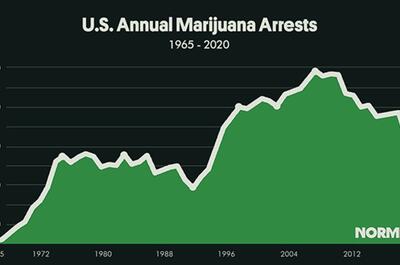FBI Report Shows Marijuana Arrests Dropped 36% in 2020

Expanding legalization and a swirling pandemic are attributed to the sharp decline of pot-related arrests during 2020. FBI data published at the end of September revealed a drop of 36%, however, hundreds of thousands of Americans continue to be arrested because of marijuana, most of them in states where the law perceives possessing marijuana as criminal activity.
Here's what the newest FBI figures affirm. 350,150 marijuana arrests took place across the US in 2020, a number decreasing from 546,602 arrests made during 2019. Roughly 91% of all busts or 317,793 Americans were taken to custody simply because they possessed cannabis. Half of all arrests took place across the Northeast. Marijuana busts represented 30.3 percent of all drug-related arrests. The chunks of data come as part of the FBI's annual Uniform Crime Report for 2020.
The decreased number of arrests year-to-year is significant. There are close to 195,000 people who might have been unnecessarily arrested and were fortunately not. It's still shocking, though, to hear that over 300,000 other people were taken in a police station, assuming that a majority of those people had small quantities of pot, most likely for personal possession. This happens as marijuana is legal in 18 states across the US plus Washington DC, and while 40 states allow medical marijuana at least in some form.
However, as NORML also mention in their blog, the last time the FBI reported so few marijuana-related arrests in a single year was in the early 1990s.
Commenting on the new FBI data, NORML Executive Director Erik Altieri said: "As more states move toward the sensible policy of legalizing and regulating cannabis, we are seeing a decline in the arrest of non-violent marijuana consumers nationwide."
Altieri added: "The fight for legalization is a fight for justice. While these numbers represent a historic decline in arrests, even one person being put into handcuffs for the simple possession of marijuana is too many."

Marijuana busts peaked in 2008 when the police were busy taking into custody 800,000 persons. Arrests are now down over 50%. The figures between 2001 and 2010 reflect a time when marijuana prohibition was still large and by. Of the 8.2 million marijuana arrests during this decade, 88% were for simply having marijuana. Blacks are at least three times more likely than whites to be arrested on pot-related charges despite roughly equal substance usage.
By 2008, medical cannabis was legal in California, Oregon, Alaska, Washington, Nevada, Maine, Hawaii, Colorado, Maryland, Vermont, Montana, Rhode Island, New Mexico, Michigan, and Massachusetts. Most of these states legalized medical cannabis through ballot measures. Nevada stood as a rare example when it did decriminalize cannabis via state legislature in 2001. Two years later, Maryland passed legislation that reduced penalties for those caught using marijuana because of an ongoing medical condition.
Then in 2012, the states of Colorado and Washington wrote history after passing Amendment 64 and Initiative 502, respectively, which for the first time permitted the adult recreational use of marijuana. Since then, cannabis legislation has been established across various parts of the US, and has the most effect, it appears, in the western states where according to the FBI, marijuana-related arrests were least likely to occur in 2020.
The prevalence of arrests in the Northeast is likely, however, to change over the following years, as several states from the region, such as New York, New Jersey and Connecticut, have finally introduced legislation and are working on to fully set up a legal, regulated cannabis market.

This year marks 110 years since prohibition started going soft. In 1911 Massachusetts began to require a prescription for sales of "Indian hemp," a designation that encompassed Cannabis Indica. By 1913, four states, California, Maine, Wyoming, and Indiana, imposed active bans on marijuana. The "War on Drugs" accelerated stigma and negative propaganda on marijuana in the early 1970s, including suspension of all scientific research on the plant.
Decriminalizing cannabis today is correcting historical injustice. Observers look forward to continuing the downward trend of marijuana arrests as more states adopt legislature and establish regulated pot markets. The end of prohibition also means a significant decline in marijuana trafficking cases across state lines, a decline in federal prosecutions, and automatic expungement or clear of records for hundreds of thousands of people charged for cannabis possession in the past.



